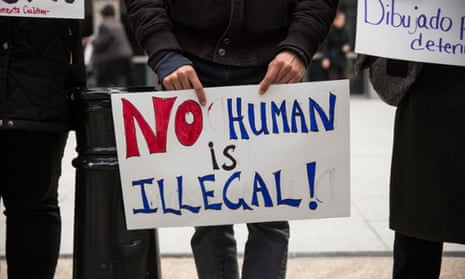Migrant mothers held at a privately-run detention centre in southern Texas have begun further peaceful protests, reportedly refusing some meals and demanding their immediate release from incarceration.
Advocates and a detained mother speaking to the Guardian from Karnes confirmed the action was taking place, although it is unclear how many detainees are taking part. US Immigration and Customs Enforcement (ICE) have declined to make specific comment on the protest at the centre, which is operated by the private security company Geo Group.
The protests follow a hunger strike lasting a week at the remote centre earlier in the month, where up to 78 mothers complained of both the conditions in detention and their length of incarceration.
“It’s very hard here, the food isn’t adequate, it’s awful, horrible … the children who eat it become sick,” said 37-year-old mother Delmi Cruz speaking by phone from the detention centre on Tuesday. “My son has horrible stomach pain and is still very sick.”
Cruz, originally from Honduras, has been detained at Karnes with her 11-year-old son for over six months. She described the situation inside the centre as “serious” and argued that the facilities were not properly cared.
The Honduran had previously attempted to enter the US in 2007 and was deported. She then moved to Los Angeles for about seven years before returning to Honduras to help her son who had been threatened by local gangs, advocates with knowledge of her case said. After reentering the US, she was sent to Karnes, with advocates arguing mothers like Cruz – who have already been deported once – are being deliberately denied bond in order to deter others from crossing the border.
Cruz, like the majority of women at the centre, has already passed a credible fear interview – the initial interview for asylum applicants – advocates said.
The Karnes facility, which has a capacity of 532 and will be expanded to hold 1,200, was reopened by ICE in August 2014, following a move by the Department of Homeland Security (DHS) to detain families arriving at the US border and claiming asylum, rather than allowing them bond.
“The decision to establish family detention facilities was in large part driven by the need to create a deterrent effect,” Esther Olavarria, a senior counselor immigration counselor for the DHS told the New York Times in January.
The centre has already been controversial, with a number of women alleging they were sexually assaulted by guards. A DHS inspector general report, however, found no evidence to substantiate the allegations.
An ICE spokeswoman did not respond to specific questions from the Guardian about the current protest, but said in a statement that the agency “takes the health, safety and welfare of those in our care very seriously”.
“ICE is closely monitoring residents a the Karnes Family Residential Center to verify residents are eating the meals that are served three times daily at the cafeteria, snacks provided by the facility, or food purchased from the commissary.”
The statement added: “ICE fully respects the rights of all people to voice their opinion without interference, and all detainees, including those in family residential facilities such as Karnes, are permitted to do so.”
Speaking at a media telephone conference on Tuesday, Kenia Galeano, a 26-year-old asylum seeker from Honduras who was detained at Karnes with her two-year-old son for five months until obtaining bond last week, said she was held in solitary confinement for a day with her child, while taking part in hunger strikes earlier in the month.
“Inside this room it was really cold, it was dark, and there was a bed and the toilet was right next to the bed,” Galeano said through a Spanish interpreter.
“We did this [hunger strike] in order to make sure that all the women, especially those who had been inside for very lengthy periods, so that they would all be released,” she added.
Galeano was granted a bond of $7,500 last Thursday, along with around three or four other mothers, said Mohammad Abdollahi, advocacy director for the Refugee and Immigrant Center for Education and Legal Services (Raices).
Abdollahi told the phone conference that mothers inside the centre had told Raices they would also be refusing all services inside and would not report for work inside the centre.
“Several of the mothers are going to refuse to send their children to school, and they’re essentially calling on their release,” Abdollahi said.

Comments (…)
Sign in or create your Guardian account to join the discussion